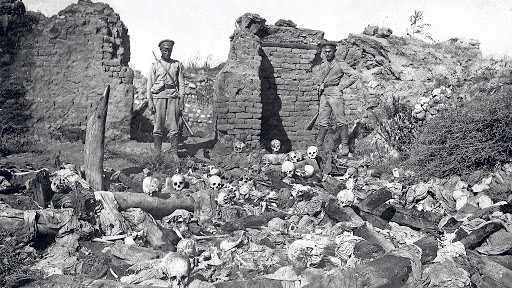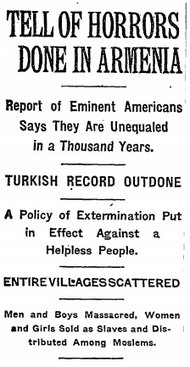Over the decades the Armenian Genocide has been thoroughly researched by historians with their efforts bringing the genocide closer and closer to the public eye. Despite this, the Armenian Genocide still doesn’t receive the attention or recognition it deserves and warrants.
The Armenian Genocide 1915-1923 saw the systematic extermination of the Armenian population by Turkish officials, with it estimated that between 1915-1916 1-1.5 million Armenians died alone.

Various scholarly work on the Armenian Genocide has proved the intent of genocide by the Turkish ruling party of the Ottoman Empire, the CUP on the Armenian population. Scholars use evidence from Western journalists that documented the genocide at the time, Western ambassadors and British, American and Turkish governmental archives. For example, a recent book published by Benny Morris and Dror Ze’evi, ‘The Thirty-Year Genocide’ details the evidence of the Armenian genocide starting from 1894 and ending in 1924.
At the time Turkish officials used the justification that the Armenians were traitors, that they would ally themselves with an enemy of the Ottoman Turks, Russia, in order to increase their independence. However, Western scholars at the time found no such threat and recorded the awful atrocities committed against the Armenian population, for example detailing the death marches into the Syrian desert.

The failure of the Allies following WW1 to crack down on those in charge of the annihilation of the Armenian population led to a rising Turkish Nationalist Movement and the creation of the Turkish Republic in 1923. Ultimately, the Armenian Genocide was swept under the carpet and buried in history, with the West too sharing this future of amnesia.
Following the Holocaust, in 1948, the UN Convention of the Prevention and Punishment of the Crime of Genocide was created which signalled the beginning of an international bond to collectively prevent future genocides. The word genocide was coined by Raphael Lemkin in 1944, who not only was influenced by the Holocaust but was heavily influenced by the horrific acts and atrocities against the Armenian population during WW1. Despite this and the creation of the UN treaty, the Armenian Genocide was not classed as a ‘genocide’ because of the apparent lack of evidence of the “intent” to destroy the Armenian population, allowing Turkey to spearhead with its posture of denial and Britain and America, a posture of amnesia. Various countries slowly started to recognise the Armenian Genocide as a ‘genocide’. However, Turkey to this day still denies that the Armenian Genocide was in fact a ‘genocide’.

In a recent Tweet on 29thJune, Mari Manoogian, American politician from Michigan, shares a letter sent from the Turkish Consul General denying, what Manoogian states, ‘happened to my family & millions of Armenians.’ Attaching pictures of the letter, the Turkish Consul General wrote “The tragic events of that period cannot be understood without a comprehensive, comparative, critical and contextual analysis and truthful reading of history…Thus, we believe that it must be discussed by historians, not by politicians.” However, the Armenian Genocide has been discussed by many historians, compiling evidence to prove the intent and destruction that causes it to be classed as a genocide.
British government still does not openly recognise the Armenian Genocide, and only recently in 2019 did the US Congress vote on the Armenian Genocide. However, as the BBC reported, Turkey’s President Recip Tayyip Erdogan ‘threatened to shut down Incirlik air base, which is based in Turkey and hosts US nuclear warheads.’[1] On 17thDecember 2019 Trump’s administration rejected Congress’ vote and still avoids fully recognising the Armenian Genocide. Britain and America’s failure to openly recognise the Armenian Genocide because of clear relations with Turkey highlights the dark society we still live in today.

The chilling extermination of the Armenian population during WW1 is not recognised by all and more current genocides, such as the Daesh genocide against Yazidis, Christians and other religious minorities, go without international recognition. The failure to openly recognise genocides has led to the allowance and ignorance of future atrocities, with minorities still fearful of their lives.

In order to prevent future genocides it is imperative that we acknowledge the past, failure to do so will lead to many more tragedies that will be buried under ensuing history.


Recently the Governor of Colorado, Jared Polis, signed a bill requiring Armenian Genocide education for high school graduation with every school district and charter school having to adopt the standards by July 1 2023. On a Facebook post, Polis shared that “Colorado high school students will learn about the Holocaust and genocide studies, some of the darkest time for humanity, so that we many never repeat history nor silently bear witness to genocide”. It is time that other states and countries follow suit.
The Holocaust is well known as it rightly should be and is an integral part of education when studying WW2, why does the Armenian Genocide not get the same treatment? Not only has Turkey’s denial of the Armenian Genocide haunted Armenian ancestry, filling them with much anger, it has denied them a crucial part of their history.

Fully recognising the Armenian Genocide is a step in the right direction to a future of justice and peace. Denying and burying history must come to an end once and for all.

I absolutely love your blog and find many of your post’s to be just what I’m looking
for. Do you offer guest writers to write content available
for you? I wouldn’t mind publishing a post or elaborating on a few of the subjects you write with regards to here.
Again, awesome web log!
LikeLike